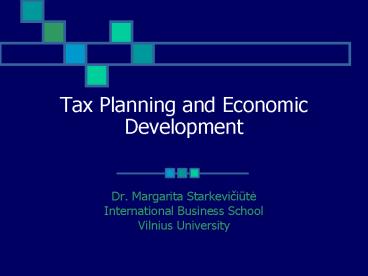Tax Planning and Economic Development - PowerPoint PPT Presentation
1 / 10
Title:
Tax Planning and Economic Development
Description:
Tax Planning and Economic Development. Dr. Margarita Starkeviciute. International Business School ... In a goods market, new technologies being available to all ... – PowerPoint PPT presentation
Number of Views:48
Avg rating:3.0/5.0
Title: Tax Planning and Economic Development
1
Tax Planning and Economic Development
- Dr. Margarita Starkeviciute
- International Business School
- Vilnius University
2
Competitiveness Mainly Affected by Personal
Abilities
- In a goods market, new technologies being
available to all the countries prices will be
determined by cheap labour (China and S. Asia) - In a service sector, need for high quality
services will grow due to an intensifying rhythm
of life and more flexible forms of labour
organisation - Competitive advantage in production will be
gained thanks to personal ability to utilise
technologies in a more creative way - Competitive advantage in services will be related
to personal culture
3
New Challenges in Tax Planning
- Methods used - detailed modeling, efficient tax
tariff, elasticity - are based on historical data
but do not take full account of ongoing global
changes - Taxes result in high product prices and
predetermine universal efficiency loss which is a
significant reserve for raising competitiveness - Deflationary processes, new technologies and an
integrated international market offering
opportunities to move payment of taxes to more
favourable places reduce possibilities of making
use of the reserve
4
Costs of Developing a Competitive Personality Grow
- More expensive education
- More complicated means and environment of
teaching, larger information flows - An employee wants specialised knowledge as well
as cultural education - Higher quality social services required
- Affect human behaviour and creativity
- Shape cultural needs
- Pressure by global changes on tax planners - tax
revenue drops, expenditure grows
5
Problems Aggravated by International
Institutions Stabilisation Policy
- Fiscal policy emphasis on investment rather than
productivity - Tax relieves to foreign investors
- Tax relieves to large Lithuanian companies
- Structural policy focus on ownership
redistribution rather than new initiatives - Much attention to shaping demand, and a supply
support function neglected - Fiscal policy priority - balance of accounts
rather than economic growth
6
Price for Fiscal Balancing - Brain Drain and
Creativity Emigration
- Countrys stability maintained by limiting wage
growth - Government transfers the burden of social
expenditure from the state to the population - Tax planning should consider the impact of a new
tax - necessity to finance the shortage of public
services - Due to competition on a labour market, personal
development and opportunity search - emigration - Would improved social environment bring emigrants
back?
7
Economic and Social Development in Lithuania
(real growth, per cent)
8
Economic and Social Development in Estonia (real
growth, per cent)
9
Consideration of Country Competitiveness in Tax
Planning
- All public social needs may be considered in
planning - Social services are poorly managed
- Universal access is not a quality guarantor
- Tax rates may have to be raised
- Effective science and social environment needs
should be considered in planning (cost-benefit
analysis) - Efficiency criteria are difficult to determine
- Assessments by the employees of the same area,
group interests
10
Experience of Company Management for Optimising
Expense Needs and Tax Plans
- Inviting management experts to administer science
and social services - Provision of managers personal responsibility
for performance - Transfer of financial functions to specialised
accounting firms - Provision of uniform procedures for public
procurement of goods and services - Outsider analysis and reduction of unproductive
costs































